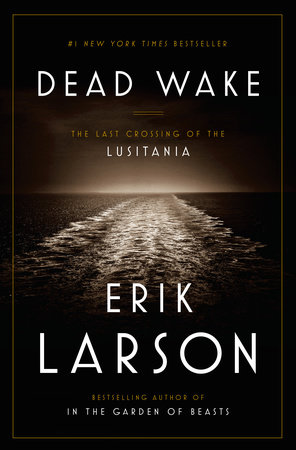Dead Wake Reader’s Guide
By Erik Larson


1. In his Note to Readers, Erik Larson writes that before researching Dead Wake, he thought he knew “everything there was to know” about the sinking of the Lusitania, but soon realized “how wrong [he] was.” What did you know about the Lusitania before reading the book? Did any of Larson’s revelations surprise you?
2. After reading Dead Wake, what was your impression of Captain Turner? Was he cautious enough? How did you react to the Admiralty’s attempts to place the blame for the Lusitania’s sinking squarely on his shoulders?
3. Erik Larson deftly weaves accounts of glamorous first-class passengers such as Alfred Gwynne Vanderbilt with compelling images of middle-class families and of the ship’s crew. Whose personal story resonated the most with you?
4. Charles Lauriat went to extraordinary measures to protect his Thackeray drawings and his rare edition of A Christmas Carol, but eventually both were lost. In Lauriat’s position, which possessions would you have tried to save? Why does Larson write in such great detail about the objects people brought aboard the Lusitania?
5. Edith Galt Wilson would come to play a significant role in the White House after Woodrow Wilson suffered a massive stroke in 1919. What made her a good match for Wilson? What other aspects of Wilson’s personal life did you find intriguing?
6. Why was Wilson so insistent on maintaining neutrality even as German U-boat attacks claimed American lives? Was his reluctance to go to war justified?
7. How did you respond to the many what-ifs that Larson raises about U.S. involvement in the Great War? Would Wilson have abandoned his isolationist stance without the Lusitania tragedy? Could Germany and Mexico have succeeded in conquering the American Southwest?
8. By attacking civilian ships, were Captain Schwieger and his U-20 crew committing acts of terrorism? Does it matter that Germany ran advertisements declaring the waters around Great Britain to be a war zone?
9. How did Captain Schwieger’s leadership style compare with that of Captain Turner? Did you feel sympathy for Schwieger and his crew?
10. Though the British Navy was tracking U-20’s location, it didn’t alert the Lusitania, nor did it provide a military escort. Why not? Do you consider Churchill and Room 40 partly to blame for the sinking? How should countries balance the integrity of their intelligence operations with their duty to protect civilians?
11. Some have argued that Churchill deliberately chose not to protect the Lusitania in hopes that the sinking of such a prominent ship would draw the United States into the war. After reading Larson’s account, what do you think of this theory?
12. While Germany’s advertisement scared away some would-be Lusitania passengers, most placed their faith in the British Navy to protect the ship, and some laughed off the risk altogether. In their position, would you have cancelled your ticket?
13. What lessons does the sinking of the Lusitania have for us in the twenty-first century?
Just for joining you’ll get personalized recommendations on your dashboard daily and features only for members.
Find Out More Join Now Sign In